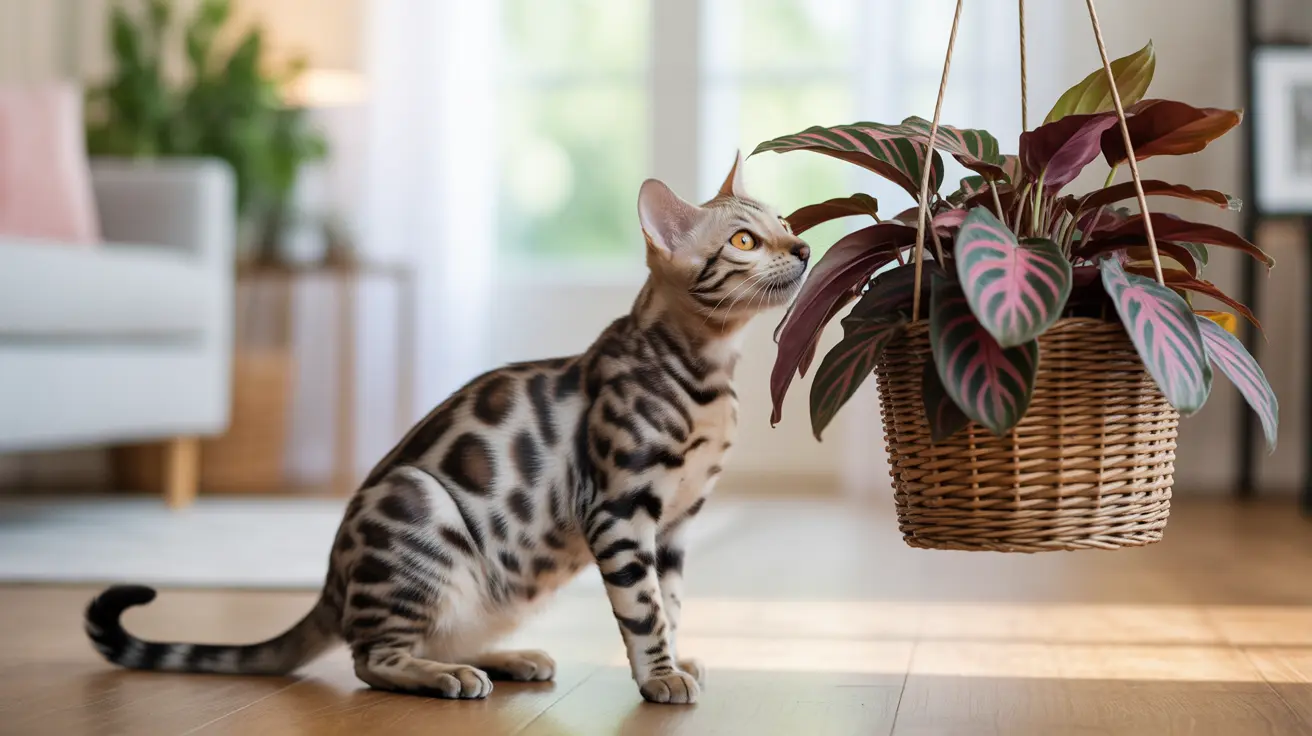Introduction
If you're a cat parent who loves to fill your home with beautiful houseplants, you've likely wondered about calathea toxic to cats concerns. The good news is that calathea plants are completely non-toxic to cats, making them an excellent choice for pet-friendly households. These stunning tropical plants, known for their vibrant, patterned leaves, have been verified as safe by both the ASPCA and veterinary experts.
However, while calathea plants don't pose any poisoning risks to your feline friends, there are still some important considerations to keep in mind. Let's explore everything you need to know about keeping both your cats and calathea plants thriving together.
Understanding Calathea Safety for Cats
Calathea plants belong to a select group of houseplants that are entirely non-toxic to cats. Unlike many common houseplants that can cause severe reactions, calathea contains no harmful substances that could poison your cat, even if they decide to take a curious nibble.
This safety extends beyond just cats - calathea plants are also safe for dogs and other household pets, making them an ideal choice for multi-pet households.
Potential Mild Reactions to Watch For
While calathea isn't toxic, consuming large amounts of any plant material can cause mild digestive upset in cats. This isn't due to toxicity but rather the plant's fibrous nature. Some possible reactions might include:
- Temporary stomach upset
- Mild vomiting
- Brief periods of diarrhea
- Increased drooling
Protecting Your Calathea from Curious Cats
Even though calathea is safe for cats, it's still important to protect your plants from damage. Here are some effective strategies:
- Place plants in hanging baskets or on high shelves
- Use deterrent sprays designed for plants
- Provide alternative entertainment like cat grass or toys
- Create dedicated "cat-free" plant areas
Benefits of Choosing Calathea for Your Home
Calathea offers several advantages that make it an excellent choice for cat-friendly homes:
- Natural air purification properties
- Striking decorative appeal
- Adaptability to indoor conditions
- Movement patterns that naturally entertain cats
- Complete pet safety
Plant Care While Protecting Your Cat
Maintaining a healthy calathea while keeping your cat safe requires some strategic planning:
- Maintain proper humidity without creating slipping hazards
- Choose pet-safe fertilizers
- Position plants away from cat traffic areas
- Monitor for signs of plant stress or damage
- Clean fallen leaves promptly to prevent temptation
Frequently Asked Questions
Is calathea safe for cats to have around the house?
Yes, calathea is completely non-toxic to cats and safe to have around your home. The ASPCA has verified that these plants pose no poisoning risk to felines.
What symptoms should I watch for if my cat eats calathea leaves?
While not toxic, eating calathea leaves might cause mild digestive upset, including temporary vomiting or diarrhea. These symptoms typically resolve on their own but consult your vet if they persist.
Can eating calathea cause any health problems in cats?
No serious health problems are associated with calathea consumption. Any mild reactions are due to the physical nature of consuming plant material, not toxicity.
How can I prevent my cat from chewing on my calathea plant?
Place plants in elevated locations, use deterrent sprays, provide alternative entertainment like cat grass, and ensure your cat has plenty of enrichment activities.
What are some other pet-friendly houseplants similar to calathea?
Other safe options include spider plants, prayer plants (maranta), and hurricane ferns. Always verify plant safety through reliable sources like the ASPCA.
Conclusion
Calathea plants offer the perfect combination of beauty and safety for cat-owning plant enthusiasts. While these plants won't harm your feline friends, taking steps to protect both your plants and pets will ensure a harmonious indoor environment. With proper placement and care, you can enjoy these stunning tropical plants while keeping your cats safe and happy.






